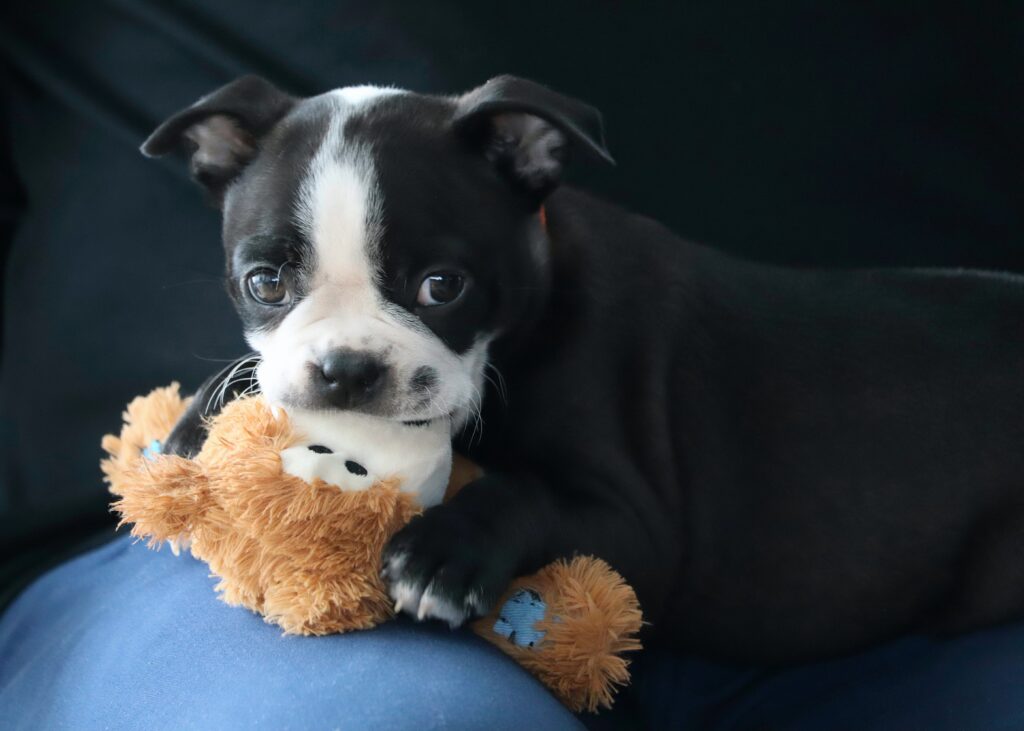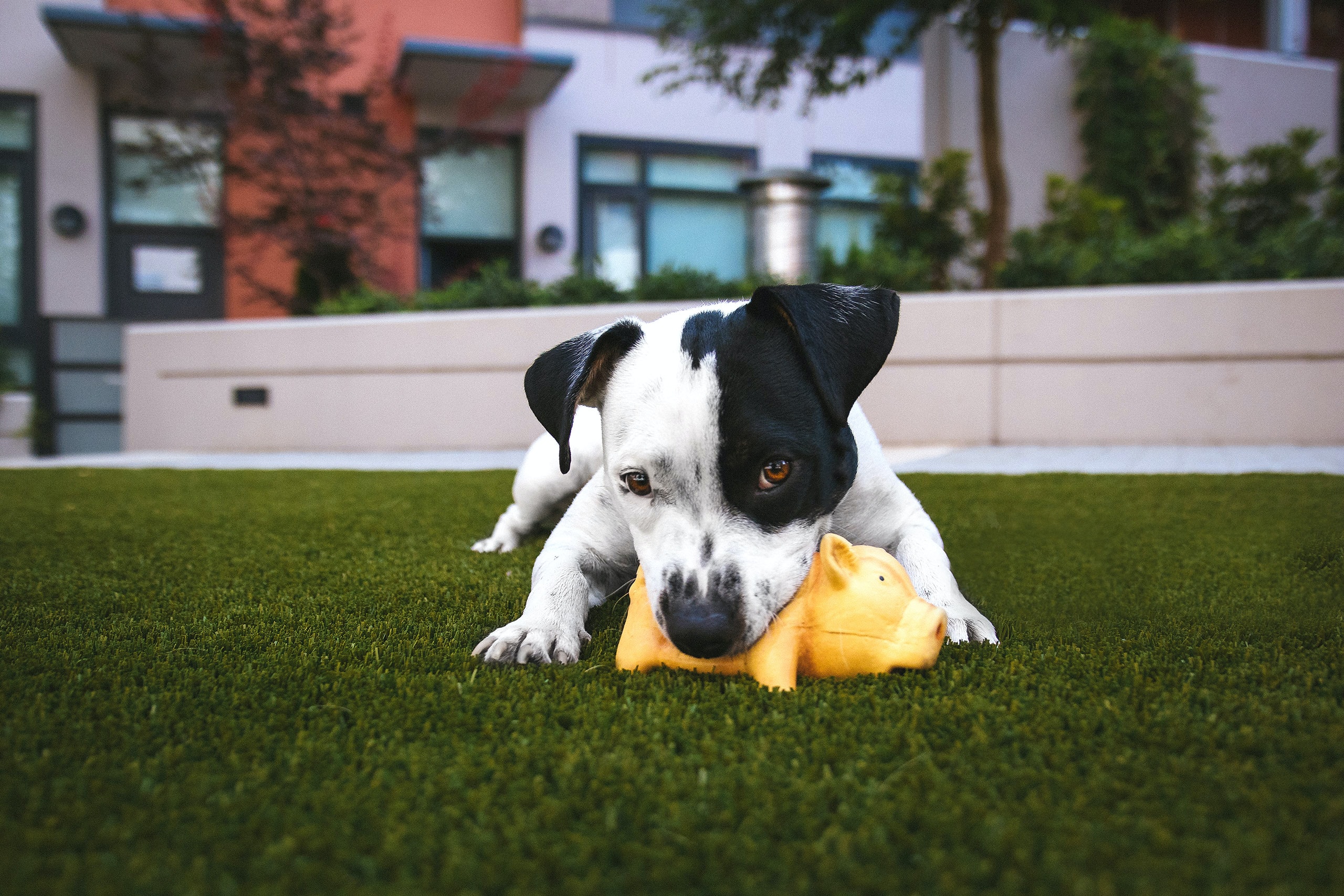At some point after getting your new puppy, I can guarantee you will search things like ‘when do puppy teeth fall out?’.
Not many people talk about puppy teething, so it can be a real shock to new puppy owners when their new fury friend starts biting.
With our first puppy it took about a week before the puppy biting started. It was a bit of a shock to be honest.
With our second puppy we had no biting at all, but I’ll talk about why that was later in the article.
>> First Night with a New Puppy – What to Expect <<
When do Puppies Stop Biting
Puppy biting can be a really stressful stage for new dog owners.
It can leave you feeling really concerned about what traits your dog is going to develop when they grow older.
It can be a scary time also, especially if you have children in the house.
Those puppy teeth are razor sharp and can really hurt when your puppy bites you.
I had marks all over my hands and holes in most of my clothes when our puppy was teething a lot.
Rest assured, puppy biting is a very natural behaviour and is a result of puppy teething.
Puppy biting usually stops at between 4 and 6 months old, around the same time as the teeth fall out.
Tips for Dealing with Puppy Teething
When it comes to managing any puppy behaviour, the key is to be patient and consistent.
Puppy teething doesn’t end overnight, but it does end.
Your puppy’s teeth may not fall out until they are 6 months old.
Some puppy’s teeth don’t fall out, and your vet will advise you what to do in this situation. Your puppy may have to have the puppy teeth taken out by the vet.
While your puppy is teething there are a few things you can do to help them.
Give Your Puppy Toys and Chews

During this time make chews and toys available to your puppy that are safe to chew on.
You might need to try a few different things before you find the thing that helps with your puppy’s teething.
Things like frozen carrots, or rolled up flannels can work well.
Having long rope toys for your puppy to play with can be a great way to create some distance between you so they are less likely to bite you.
>> What to Buy for a New Puppy <<
Create a Good Routine
Having a good routine for your puppy around mealtimes, naps and play has so many benefits.
A good routine can really help with managing puppy biting also.
A puppy is more likely to make poor choices around biting and nipping if it is tired.
Sometimes if the biting behaviour is becoming manic, a good nap might be all they need.
Leave the Room
If your puppy is biting a lot, simply leaving the room can be very effective.
A puppy would much rather have your company, so it can be a very clear signal that you are not happy with their behaviour.
Reward Good Choices
Positive reinforcement really helps your puppy to understand what is expected of them in any given situation.
If your puppy makes a good choice, then give them a reward and let them know they are on the right track.
>> When to Start Training a Puppy <<
Be Consistent
Whichever strategies you use to distract your puppy from teething and puppy biting, use them consistently.
A puppy learns the best from repetition and praise.
It may take a few months for puppy teething to end, but it will be worth it in the end.
When will my Puppy Stop Biting
Your puppy will stop teething around 4-6 months.
You may even start to find their puppy teeth around the house when they start falling out.
When we found our puppy’s teeth, we were over the moon as we knew the end was in sight.
Your vet will look at their teeth during during your puppy’s check up and make sure they have all fallen out.
Our second puppy hadn’t lost all her teeth by 8 months, and the vet decided that if they were still there when she was neutered, they would remove them then.
Final Thoughts
Puppy teething can be a really challenging time and my experience is that most new dog owners know very little about this stage.
Having a puppy can be really hard, and teething can be really stressful for you all.
Please rest assured that your puppy’s behaviour is completely natural and it will end.
We got a second puppy when our first dog was around 10 months old.
We realised quite quickly that the second puppy didn’t bite us at all.
Because she had another dog to play with and direct this behaviour towards, we had no trouble with her teething at all.
I know lots of people won’t have a second dog for their puppy to ‘bite’, but what it did show me was that this behaviour was completely natural and not to worry about it.
The puppy would bite our other dog’s ears and tail and when she’d had enough she’d gently correct her.
When the puppy biting gets really bad, remember that you have replaced their mum and litter mates, so all the behaviours that they would have shown to other dogs are now being directed towards you.
Most importantly, remember that puppy teething does end.
